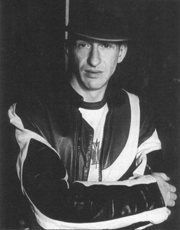 Greg Kramer
Greg Kramer
|
by Anna Bratulic
Drama students congregate noisily outside the F. C. Smith Auditorium a half-hour
before rehearsal for the next production starts. Some sit chatting with
the director, others sing along to a tune being played on the piano. It
is a large cast —18 actors playing more than 35 roles — but then,
William Shakespeare is not known for his two-handers.
“My biggest problem right now is making each actor keep their allegiance,”
said director Greg Kramer, “so that you as an audience member don’t
say, ‘Wait a minute, weren’t they on the other side a few minutes
ago?’
“That was a tough thing in casting, making sure that we had enough
numbers for the battle at the end, because people die and I didn’t
want them to suddenly come back to life again three scenes later (as another
character) — unless they’re a ghost.”
Private-school adaptation
Julius Caesar (written in 1599) is one of Shakespeare’s most
celebrated plays. It centres around an actual historical event, the plot
to assassinate Rome’s illustrious ruler on the Ides of March (March
14), 44 BC, and the revenge his supporters exact on the treacherous though
well-intentioned murderers.
The subject matter of the play — politics and the military in ancient
Rome — easily lends itself to an expensive production, particularly
in terms of costume rental, so Kramer decided that there will be no togas
and breastplates in this one, but rather a uniform, private-school look
that can still convey the central idea of revolution and conspiracy to overthrow
government.
It soon became apparent to Kramer that Shakespeare presented other challenges,
particularly to the novice actor.
“Shakespeare is the closest you’ll get to opera in the theatrical
arts,” he said in an interview. “The vocal requirements and the
technical requirements of metre are not necessarily stringent, but they
are demanding.
“We’re following the first folio edition, and if you look in the
folio you’ll see that there are long [archaic] spellings and capitalizations,
and those give you clues as to how to play the line as you go along. Yes,
of course, it’s open to interpretation, but there are techniques in
being able to make it work.”
Once everyone gets past understanding the quasi-foreign Elizabethan text,
there is the task of interpreting the play, most of which is written in
poetic form, so that it doesn’t sound like the actor is reciting poetry.
One helpful hint is to know that Shakespearean characters don’t keep
their thoughts to themselves.
“Shakespeare is different from modern drama, in that what we call the
subtext practically doesn’t exist. The characters are speaking their
subtext. Everything happens on the sound, on the line. You can imbue a line
with meaning because it’s got lots of alliteration [similar sounds]
in it, for example,” Kramer said.
“The subtext in modern theatre would be hidden — it’s underneath,
played under the line, intent-wise. When you’re playing the line, you’d
have all your inner thoughts bubbling away underneath, not so much affecting
the line directly. Whereas with Shakespeare, you get right on top of it
and you’re right in the moment.”
Regular TV cameos
Raised in London, England, Kramer spreads his time evenly between acting
and directing. On the television screen, he is a regular on John Woo’s
Once A Thief, La Femme Nikita, and has appeared in TV shows such
as Due South and PSI Factor. His Shakespeare credits include
acting in the title role of Richard III, and playing Petruchio in
The Taming of the Shrew. He recently directed Yasmina Reza’s
intellectual comedy hit Art at Centaur Theatre.
Julius Caesar, a production of the Concordia Theatre Department, plays
March 7, 8, 9, 13, 14, 15, 16 at 8 p.m., with a matinee at 2 p.m. on March
16, in the F.C. Smith Auditorium at Loyola. Tickets cost $5 for students
and $10 for the public and should be reserved by calling 848-4742. Any reserved
tickets not picked up 15 minutes prior to showtime are up for grabs.
|
|
|



